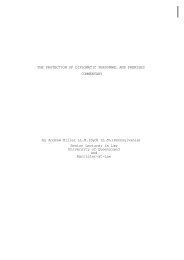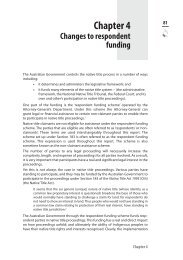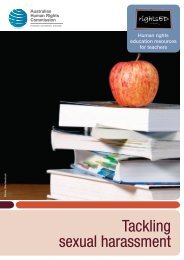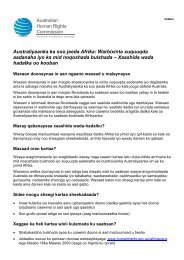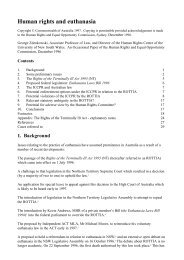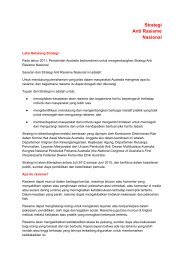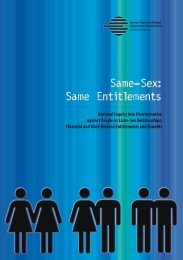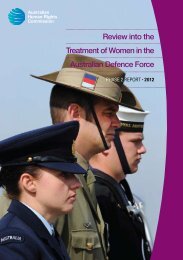Chapter 10: Minimising Risk, Managing Incidents and Ensuring <strong>the</strong> Safety <strong>of</strong> <strong>the</strong> Workplace – Recommend<strong>at</strong>ions 22-31Never<strong>the</strong>less, <strong>the</strong>se checks are only a short term solution th<strong>at</strong> depend on individuals’ skills, and <strong>the</strong>continued smooth functioning <strong>of</strong> <strong>the</strong> system. A mand<strong>at</strong>ed annual quality assurance mechanism would<strong>of</strong>fer more stability in <strong>the</strong> longer term.ConclusionThe intent <strong>of</strong> Recommend<strong>at</strong>ion 25 appears to have been met. At <strong>the</strong> completion <strong>of</strong> <strong>the</strong> Audit, ADFA waswaiting for a fact sheet from DSPR around which it could base its str<strong>at</strong>egic organis<strong>at</strong>ional response to<strong>the</strong> Unacceptable Behaviour survey (conducted in September 2012). DSPR is a small organis<strong>at</strong>ion witha large body <strong>of</strong> work to complete. If it is unable to provide a formal fact sheet in a timely way, ADFAshould draw from <strong>the</strong> entire report provided to it, and especially <strong>the</strong> executive summary, in order to givesome feedback to staff and undergradu<strong>at</strong>es, and to develop a response to issues <strong>of</strong> concern. Regularadministr<strong>at</strong>ions <strong>of</strong> <strong>the</strong> survey and meaningful follow ups are necessary in order for ADFA to be able tocre<strong>at</strong>e benchmarks, measure progress and ensure effective organis<strong>at</strong>ional responses.ADFA and DSPR have developed a series <strong>of</strong> surveys and research proposals with <strong>the</strong> aim <strong>of</strong> collectinga wider range <strong>of</strong> comparable d<strong>at</strong>a across <strong>Defence</strong> and external to it. They have done this with minimalresources and without <strong>the</strong> authority to compel outside parties’ involvement. The Audit commends ADFAand DSPR on <strong>the</strong>se efforts.The new complaints and incidents systems viewed by <strong>the</strong> Audit in early 2013 s<strong>at</strong>isfy <strong>the</strong> intent <strong>of</strong>Recommend<strong>at</strong>ion 27. The systems have met <strong>the</strong> intent <strong>of</strong> <strong>the</strong> recommend<strong>at</strong>ions as well as possiblewithin privacy constraints. Improvements have been driven by better educ<strong>at</strong>ion, a series <strong>of</strong> COMDT’sDirectives outlining aspects <strong>of</strong> <strong>the</strong> discipline regime, and a reorganis<strong>at</strong>ion <strong>of</strong> ADFA’s resources. Thesechanges have meant th<strong>at</strong> ADFA has had <strong>the</strong> knowledge and capacity to collect inform<strong>at</strong>ion and organiseits systems in a more transparent and usable way.Better clarity <strong>of</strong> inform<strong>at</strong>ion and processes to provide reports to <strong>the</strong> COMDT and o<strong>the</strong>r senior staff arepromising developments. These processes were only months old <strong>at</strong> <strong>the</strong> completion <strong>of</strong> <strong>the</strong> Audit andshould be monitored for effectiveness and any necessary adjustments should be made.The design <strong>of</strong> <strong>the</strong> new incidents management systems provides for some level <strong>of</strong> internal checking, buta formal annual quality assurance mechanism is still required for <strong>the</strong> longer term integrity <strong>of</strong> <strong>the</strong> system.1 DSPR was known as DSPPR until recently. Most reports cited are <strong>at</strong>tributed to DSPPR, but <strong>the</strong> new name is used in <strong>the</strong> text.2 Director<strong>at</strong>e <strong>of</strong> Str<strong>at</strong>egic People Policy Research, <strong>Australian</strong> <strong>Defence</strong> <strong>Force</strong> Academy 2011 Unacceptable Behaviour Survey,DSPPR Report 5/2011, Department <strong>of</strong> <strong>Defence</strong> (2011), p 2.3 <strong>Australian</strong> Human Rights Commission, Report on <strong>the</strong> <strong>Review</strong> <strong>into</strong> <strong>the</strong> Tre<strong>at</strong>ment <strong>of</strong> Women <strong>at</strong> <strong>the</strong> <strong>Australian</strong> <strong>Defence</strong> <strong>Force</strong>Academy, 2011, p 32. At http://www.humanrights.gov.au/defencereview/index.html (viewed 13 February 2013).4 Director<strong>at</strong>e <strong>of</strong> Str<strong>at</strong>egic People Policy Research, <strong>Australian</strong> <strong>Defence</strong> <strong>Force</strong> Academy 2012 Unacceptable Behaviour SurveyReport, DSPPR Report 18/2012 Department <strong>of</strong> <strong>Defence</strong> (2012), p 122.5 MAJGEN J Rosenfeld, ‘<strong>Australian</strong> <strong>Defence</strong> Human Research Ethics Committee (ADHREC) Protocol 675-12 – ADFA 2012Unacceptable Behaviour Survey’, 19 September 2012, provided to <strong>the</strong> Audit by Dr N Miller 28 September 2012.6 Director<strong>at</strong>e <strong>of</strong> Str<strong>at</strong>egic People Policy Research, <strong>Australian</strong> <strong>Defence</strong> <strong>Force</strong> Academy 2012 Unacceptable Behaviour SurveyReport, DSPPR Report 18/2012, Department <strong>of</strong> <strong>Defence</strong>.7 Meeting with DSPR, 19 February 2013.8 For example ‘sexual stories or <strong>of</strong>fensive jokes’ shared ‘among friends joking outside <strong>of</strong> <strong>the</strong> workplace’ may not be thought <strong>of</strong>as unacceptable but may be recorded as such in <strong>the</strong> 2011 survey. Director<strong>at</strong>e <strong>of</strong> Str<strong>at</strong>egic People Policy Research, <strong>Australian</strong><strong>Defence</strong> <strong>Force</strong> Academy 2012 Unacceptable Behaviour Survey Report, DSPPR Report 18/2012, Department <strong>of</strong> <strong>Defence</strong> (2012),p 121.9 The c<strong>at</strong>egories are:• work-rel<strong>at</strong>ed harassment• person-rel<strong>at</strong>ed harassment• physical-rel<strong>at</strong>ed harassment• bullying114
• discrimin<strong>at</strong>ion• abuse <strong>of</strong> power• crude behaviour• unwanted sexual <strong>at</strong>tention• sexual coercion• acts <strong>of</strong> indecency• sexual assault (minor)• sexual assault (major)• o<strong>the</strong>r acts/harassment.10 Director<strong>at</strong>e <strong>of</strong> Str<strong>at</strong>egic People Policy Research, <strong>Australian</strong> <strong>Defence</strong> <strong>Force</strong> Academy 2012 Unacceptable Behaviour SurveyReport, DSPPR Report 18/2012, Department <strong>of</strong> <strong>Defence</strong> (2012), p 122.11 The sexual harassment total was obtained by grouping:• crude behaviour (sexually suggestive comments, gestures or jokes th<strong>at</strong> made you feel <strong>of</strong>fended; sexually explicit pictures,posters or gifts th<strong>at</strong> made you feel <strong>of</strong>fended; sexually explicit emails, social media messages, or SMS/MMS th<strong>at</strong> made youfeel <strong>of</strong>fended)• unwanted sexual <strong>at</strong>tention (inappropri<strong>at</strong>e staring or leering th<strong>at</strong> made you feel intimid<strong>at</strong>ed; intrusive questions aboutyour priv<strong>at</strong>e life or physical appearance th<strong>at</strong> made you feel <strong>of</strong>fended; repe<strong>at</strong>ed or inappropri<strong>at</strong>e advances on email, socialnetworking websites or internet ch<strong>at</strong> rooms; repe<strong>at</strong>ed or inappropri<strong>at</strong>e invit<strong>at</strong>ions to go out on d<strong>at</strong>es; unwelcome touching,hugging, cornering or kissing)• sexual coercion (requests or pressure for sex or o<strong>the</strong>r sexual acts).See Director<strong>at</strong>e <strong>of</strong> Str<strong>at</strong>egic People Policy Research, <strong>Australian</strong> <strong>Defence</strong> <strong>Force</strong> Academy 2012 Unacceptable Behaviour SurveyReport, DSPPR Report 18/2012, Department <strong>of</strong> <strong>Defence</strong> (2012), pp 103-4.12 The sexual <strong>of</strong>fence total was obtained by grouping:• acts <strong>of</strong> indecency (exposed <strong>the</strong>mselves in a way th<strong>at</strong> made you feel <strong>of</strong>fended; w<strong>at</strong>ched or recorded you without yourconsent while you were in priv<strong>at</strong>e, which made you feel <strong>of</strong>fended; any o<strong>the</strong>r unwanted sexual behaviour or touching withoutyour consent)• sexual assault (minor) (inappropri<strong>at</strong>e physical contact) and• sexual assault (major) (actual or <strong>at</strong>tempted rape or sexual assault).See Director<strong>at</strong>e <strong>of</strong> Str<strong>at</strong>egic People Policy Research, <strong>Australian</strong> <strong>Defence</strong> <strong>Force</strong> Academy 2012 Unacceptable Behaviour SurveyReport, DSPPR Report 18/2012, Department <strong>of</strong> <strong>Defence</strong> (2012), p 105.13 RIT, ‘Broderick Audit Summary Final 280912’, provided to <strong>the</strong> Audit by Dr N Miller, 28 September 2012.14 MAJGEN J Rosenfeld, ‘<strong>Australian</strong> <strong>Defence</strong> Human Research Ethics Committee (ADHREC) Protocol 675-12 – <strong>Australian</strong> <strong>Defence</strong><strong>Force</strong> Training Establishments 2012 Unacceptable Behaviour Survey’, 19 September 2012, provided to <strong>the</strong> Audit by Dr N Miller,28 September 2012.15 For example, ADFA is larger, more diverse (in terms <strong>of</strong> Service and gender) and undergradu<strong>at</strong>es are <strong>the</strong>re for longer incomparison to RMC. This is reflected in <strong>the</strong> respondents demographics from <strong>the</strong> respective surveys:ADFARMCRespondents (% <strong>of</strong> total site popul<strong>at</strong>ion) 627 (72.5%) 295 (69.6%)Female respondents (% <strong>of</strong> respondents) 128 (20.4%) 28 (9.5%)Army respondents (% <strong>of</strong> respondents) 295 (47.4%) 269 (91.2%)In addition, ADFA respondents were split rel<strong>at</strong>ively evenly among first (37.7%), second (35.2%) and third year (27.1%)undergradu<strong>at</strong>es, while respondents <strong>at</strong> RMC were most likely to have been <strong>at</strong> <strong>the</strong> college for less than one year. DSPR noteth<strong>at</strong> this affects comparability, as <strong>the</strong> unacceptable behaviour surveys ask about <strong>the</strong> previous 12 month period. Most ADFArespondents would be able to refer to an entire 12 month period while most RMC respondents would not.16 Director<strong>at</strong>e <strong>of</strong> Str<strong>at</strong>egic People Research, Royal Military College Duntroon 2012 Unacceptable Behaviour Survey Report, DSPRReport 1/2013, Department <strong>of</strong> <strong>Defence</strong>.17 J Vaile, email to <strong>the</strong> Audit, 16 January 2013.18 J Vaile, email to <strong>the</strong> Audit, 7 February 2013.19 DSPR, ‘Proposed option for Unacceptable Behaviour d<strong>at</strong>a collection in <strong>Defence</strong>’, provided to <strong>the</strong> Audit by J Vaile, 16 January2013.20 The scope <strong>of</strong> a QA is outlined in Department <strong>of</strong> <strong>Defence</strong>, <strong>Defence</strong> Instructions (General) ADMIN 67-2, Quick Assessment,7 August 2007.21 Interview 50, senior ADFA staff, 19 February 2013; CDRE BJ Kafer, ‘Commandant’s Directive 14/12 – ‘Quick assessments and“serious or complex incidents’’, 24 September 2012, provided to <strong>the</strong> Audit by Dr N Miller, 21 November 2012.22 QA Report Templ<strong>at</strong>e in CDRE BJ Kafer, ‘Commandant’s Directive 14/12 – ‘Quick assessments and “serious or complexincidents”, 24 September 2012, provided to <strong>the</strong> Audit by Dr N Miller, 21 November 2012.23 Interview 50, senior ADFA staff, 19 February 2013.24 The QA resister captures QA number, subject, description <strong>of</strong> incident, start d<strong>at</strong>e, finish d<strong>at</strong>e, assessor’s details, recommendedaction, decision, file, security classific<strong>at</strong>ion, record <strong>of</strong> implement<strong>at</strong>ion.25 Interview 50, senior ADFA staff, 19 February 201326 Interview 51, SQNLDR A Fullick, 19 February 2013.Audit Report: <strong>Review</strong> <strong>into</strong> <strong>the</strong> Tre<strong>at</strong>ment <strong>of</strong> Women <strong>at</strong> <strong>the</strong> <strong>Australian</strong> <strong>Defence</strong> <strong>Force</strong> Academy • 2013 • 115
- Page 1 and 2:
Review into the Treatmentof Women a
- Page 3:
Audit Report:Review into the Treatm
- Page 6 and 7:
ContentsA Message from the Commissi
- Page 8 and 9:
A Message from the CommissionerADFA
- Page 10 and 11:
Chapter 1:Audit ApproachThe Report
- Page 12 and 13:
Chapter 1: Audit ApproachThe Audit
- Page 14 and 15:
Chapter 2: Summary of Audit Finding
- Page 16 and 17:
Chapter 2: Summary of Audit Finding
- Page 18 and 19:
Chapter 2: Summary of Audit Finding
- Page 20 and 21:
Chapter 3: MethodologyQuantitative
- Page 22 and 23:
Chapter 4:Implementationof ReviewRe
- Page 25 and 26:
Organisational PressuresDefence is
- Page 27 and 28:
[My awareness is] pretty limited I
- Page 30 and 31:
Chapter 5:ADFA’s Role andPurposeR
- Page 32 and 33:
Chapter 5: ADFA’s Role and Purpos
- Page 34 and 35:
Chapter 5: ADFA’s Role and Purpos
- Page 36:
Chapter 5: ADFA’s Role and Purpos
- Page 40 and 41:
Chapter 6:Equity and DiversityRecom
- Page 42 and 43:
Chapter 6: Equity and Diversity - R
- Page 44 and 45:
Chapter 6: Equity and Diversity - R
- Page 46 and 47:
Chapter 6: Equity and Diversity - R
- Page 48 and 49:
Chapter 6: Equity and Diversity - R
- Page 50 and 51:
Chapter 6: Equity and Diversity - R
- Page 52 and 53:
Chapter 7:ADFA’s Structure andSta
- Page 54 and 55:
Chapter 7: ADFA’s Structure and S
- Page 56 and 57:
Chapter 7: ADFA’s Structure and S
- Page 58 and 59:
Chapter 7: ADFA’s Structure and S
- Page 60 and 61:
Chapter 7: ADFA’s Structure and S
- Page 62 and 63:
Chapter 7: ADFA’s Structure and S
- Page 64 and 65:
Chapter 7: ADFA’s Structure and S
- Page 66 and 67:
Chapter 7: ADFA’s Structure and S
- Page 68 and 69:
Chapter 7: ADFA’s Structure and S
- Page 70 and 71: Chapter 7: ADFA’s Structure and S
- Page 72 and 73: Chapter 8:Midshipmen and Cadetsare
- Page 74 and 75: Chapter 8: Midshipmen and Cadets ar
- Page 76 and 77: Chapter 8: Midshipmen and Cadets ar
- Page 78 and 79: Chapter 8: Midshipmen and Cadets ar
- Page 80 and 81: Chapter 8: Midshipmen and Cadets ar
- Page 82 and 83: Chapter 8: Midshipmen and Cadets ar
- Page 84 and 85: Chapter 8: Midshipmen and Cadets ar
- Page 86 and 87: Chapter 9:Accommodation andSupervis
- Page 88 and 89: Chapter 9: Accommodation and Superv
- Page 90 and 91: Chapter 9: Accommodation and Superv
- Page 92 and 93: Chapter 9: Accommodation and Superv
- Page 94 and 95: Chapter 9: Accommodation and Superv
- Page 96 and 97: Chapter 9: Accommodation and Superv
- Page 98 and 99: Chapter 10: Minimising Risk, Managi
- Page 100 and 101: Chapter 10: Minimising Risk, Managi
- Page 102 and 103: Chapter 10: Minimising Risk, Managi
- Page 104 and 105: Chapter 10: Minimising Risk, Managi
- Page 106 and 107: Chapter 10: Minimising Risk, Managi
- Page 108 and 109: Chapter 10: Minimising Risk, Managi
- Page 110 and 111: Chapter 10: Minimising Risk, Managi
- Page 112 and 113: Chapter 10: Minimising Risk, Managi
- Page 114 and 115: Chapter 10: Minimising Risk, Managi
- Page 116 and 117: Chapter 10: Minimising Risk, Managi
- Page 118 and 119: Chapter 10: Minimising Risk, Managi
- Page 122 and 123: Chapter 10: Minimising Risk, Managi
- Page 124 and 125: Chapter 10: Minimising Risk, Managi
- Page 126 and 127: Chapter 10: Minimising Risk, Managi
- Page 128 and 129: Chapter 10: Minimising Risk, Managi
- Page 130 and 131: Chapter 10: Minimising Risk, Managi
- Page 132 and 133: Chapter 10: Minimising Risk, Managi
- Page 135 and 136: Further InformationAustralian Human



